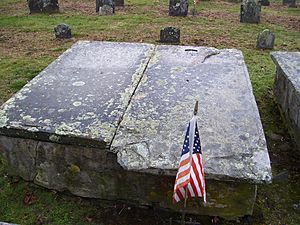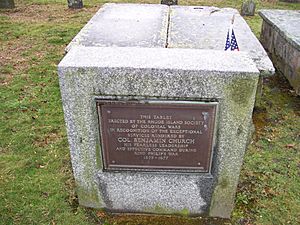Benjamin Church (ranger) facts for kids
Quick facts for kids
Benjamin Church
|
|
|---|---|
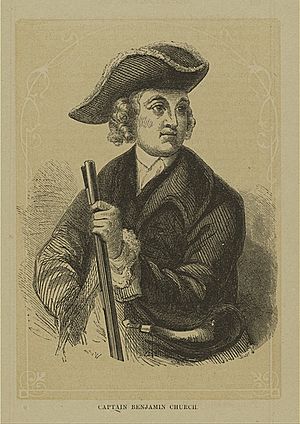
Colonel Benjamin Church: Forerunner of the United States Army Rangers
|
|
| Born | c. 1639 Plymouth, Plymouth Colony, British America |
| Died | January 17, 1718 (aged 78–79) Little Compton, Rhode Island, British America |
| Allegiance | Plymouth Colony (England) |
| Service/ |
Plymouth Colony Militia |
| Rank | Colonel |
| Battles/wars | King Philip's War
|
| Other work | representative |
| Signature | |
Benjamin Church (born around 1639, died January 17, 1718) was an important English colonist in North America. He was a brave military leader. Many people see him as the first "Ranger" in America. He led special forces starting in 1675.
Church was asked by Josiah Winslow, the Governor of the Plymouth Colony, to create the first Ranger company. This was for a big conflict called King Philip's War. Later, he led his company to raid areas in Acadia during King William's War and Queen Anne's War. These wars happened in the early 1700s when France and England were fighting for control of land in North America.
Benjamin Church learned a lot from Native American fighting styles. He created his forces to be small and flexible. They used the woods and land for cover, instead of marching in straight lines. English colonists became skilled Rangers by learning from their Native American allies. Rangers relied on Native Americans as both friends and teachers for a long time.
Church formed a special full-time unit. It included European colonists who were good at living on the frontier. It also had friendly Native Americans. This team carried out attacks against hostile Native Americans and the French in tough areas. Church used these Rangers when normal army tactics didn't work. His book, Entertaining Passages relating to Philip's War, was published in 1716. It is considered the first American military guide.
Contents
Who Was Benjamin Church?
Benjamin Church was born in Plymouth Colony around 1639. His parents were Richard Church and Elizabeth Warren. His grandmother, Elizabeth Warren, was one of the original passengers on the Mayflower ship. He grew up on the frontier, which was the edge of the settled areas.
He married Alice Southworth on December 26, 1667. They lived in Duxbury, Massachusetts for a while. Later, they moved to Bristol and then to Little Compton, Rhode Island. Both Benjamin and Alice Church are buried there. Alice's grave has a special stone called a table grave.
Benjamin Church and King Philip's War
During King Philip's War, Church was a main military helper to Governor Josiah Winslow of Plymouth Colony. He became a captain on July 24, 1675. He fought in the war (1675–1678) in New England. He fought against the Wampanoag, Nipmuc, and Podunk Native American tribes.
Church is famous for leading a group of English colonists and Native Americans on his own. His men were the first colonial force to successfully raid enemy camps in forests and swamps. Before this, colonists usually defended themselves. Native Americans knew their land very well. Relations were mostly peaceful until 1675. But tensions grew as colonists took more Native American land.
Church was allowed to recruit Native Americans for his unit. This happened after leaders realized that old European fighting methods didn't work well on the frontier. He also convinced many neutral or even enemy Native Americans to join his team. They became very skilled special troops. Some of these men were Christian Native Americans called Praying Indians. Church organized these troops. They tracked enemy Native Americans into forests and swamps. They carried out effective raids and surprise attacks.
The Great Swamp Fight
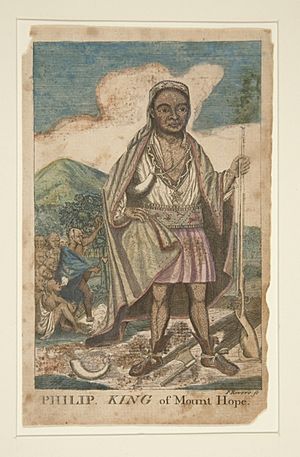
On December 19, 1675, a major battle called the Great Swamp Fight took place. Church was hurt while helping Governor Winslow, who led the colonial forces. Armies from Massachusetts, Plymouth, and Connecticut colonies killed about 300 Narragansett warriors. Many Narragansett women and children also died. The Narragansett people who survived ran away and hid for the rest of the war.
After the Great Swamp Fight, Church and the colonial army were far from their base. They had to march a long way in severe cold. They also had to carry their dead and wounded soldiers.
The war ended soon after. On August 12, 1676, one of Church's Native American allies, John Alderman, killed King Philip. King Philip was the leader of the Wampanoag tribe.
Benjamin Church in King William's War
During King William's War (1688–97), Church led four raids into Acadia. This area included most of present-day Maine. He fought against French settlers, called Acadians, and hostile Native Americans, including the Abenaki.
On his first trip to Acadia, on September 21, 1689, Major Church led 250 troops. He had been promoted to major on September 6. His mission was to protect English settlers in Falmouth, Maine (now Portland, Maine). This was during the Battle of Brackett's Wood. Twenty-one of his men died, but Church succeeded, and the enemy retreated.
Church went back to Boston, leaving the settlers unprotected. In May 1690, over 400 French and Native American troops attacked Falmouth. They killed all the English settlers in the Battle of Fort Loyal. When Church returned later that summer, he buried the dead.
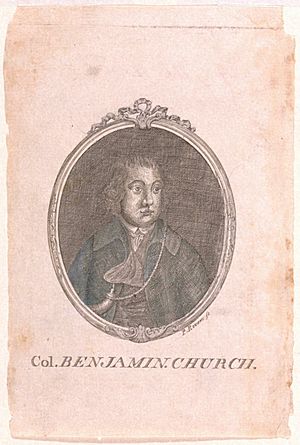
In Church's second trip, on September 11, 1690, he led 300 men at Casco Bay. His goal was to help the English Fort Pejpescot (now Brunswick, Maine). The fort had been taken by Native Americans. He went up the Androscoggin River to Fort Pejepscot. From there, he traveled 40 miles upriver to Livermore Falls, Maine. He attacked an Androscoggin Native American village. Church's men shot three or four Native American men as they ran away. Church found five English captives in the homes. Church killed six or seven prisoners and took nine others. A few days later, the Androscoggin attacked Church at Cape Elizabeth. They killed seven of his men and wounded 24 others. On September 26, Church returned to Portsmouth, New Hampshire.
Church's third trip during the war was in 1692. He raided the Penobscot territory (now Indian Island, Maine) with 450 men. Church and his men then raided Taconock (now Winslow, Maine).
Four years later, Major Church led a fourth trip. He carried out the Siege of Fort Nashwaak (1696) (now Fredericton, New Brunswick). This was the capital of Acadia at the time. He also led the Raid on Chignecto (1696) in Acadia. Church was described as weighing about 250 pounds, but he personally led his troops. They killed the people of Chignecto, stole their belongings, burned their houses, and killed their farm animals.
Benjamin Church in Queen Anne's War
During Queen Anne's War, Church went on his fifth and final trip into Acadia. The Deerfield Massacre had happened in western Massachusetts on February 29, 1704. It was believed to be carried out by Native Americans encouraged by the French. Many settlers were killed. Over 100 captives were taken to Montreal and a Mohawk village. These captives were often held for ransom. Some younger ones were adopted by Mohawk families.
On March 18, 1704, Massachusetts Governor Joseph Dudley made Church a colonel. He was put in charge of a force to raid French settlements in Acadia. This was in return for the Deerfield attack. This trip included raids on Castine, Maine, St. Stephen, New Brunswick, Grand Pre, Pisiguit (now Falmouth and Windsor), and Chignecto.
Church planned the trip very carefully. He even specified the design of the special boats to be used. He also decided what kind of hatchets his soldiers should carry. Church took John Gyles, who had been held captive by the Maliseet, as his translator. Church took prisoners and said he left only five houses standing in Acadia. In the Raid of Pisiguit (1704), he took the leader Noel Doiron as a prisoner.
Church's Military Ideas
Church didn't write formal books about military strategy. But his memoirs give many details about how he fought. By studying his experiences, experts have summarized his ideas:
- Always plan each operation carefully, leaving nothing to chance.
- Make sure soldiers are well-trained, fed, and have the right equipment.
- Build friendships with possible allies, like Native Americans. Other commanders might have ignored or mistrusted them.
- Do not cause unnecessary damage or harm.
- Use quietness and surprise to gain an advantage.
- Understand how a small action fits into the bigger goals of the war.
- Lead by example, being at the front with your troops.
- Keep in touch with leaders above you and soldiers below you.
Later Life and Legacy
Church was elected to public office. He was the first representative for Bristol in the Plymouth Colony government. He served from 1682 to 1684.
Benjamin Church died in Little Compton, Rhode Island in 1718. He was buried in the Little Compton Common cemetery.
Church kept notes about his tactics and actions from 1675-1676. His work was published in 1716 as Entertaining Passages relating to Philip's War. Church was the great-grandfather of Dr. Benjamin Church. This Dr. Church was the first "Surgeon General" of the Continental Army. He was later arrested by General George Washington as a suspected spy for the British.
Other famous military groups, like Rogers' Rangers and Gorham's Rangers, were created following the traditions Church started.
In 1992, Benjamin Church was added to the U.S. Army Ranger Hall of Fame. This was to honor his new military methods. A bronze Ranger Tab was placed on his gravestone to mark this honor.
The Rhode Island Society of Colonial Wars placed a plaque near Colonel Church's grave. It honors his leadership and bravery during King Philip's War.
Images for kids
 | Dorothy Vaughan |
 | Charles Henry Turner |
 | Hildrus Poindexter |
 | Henry Cecil McBay |


